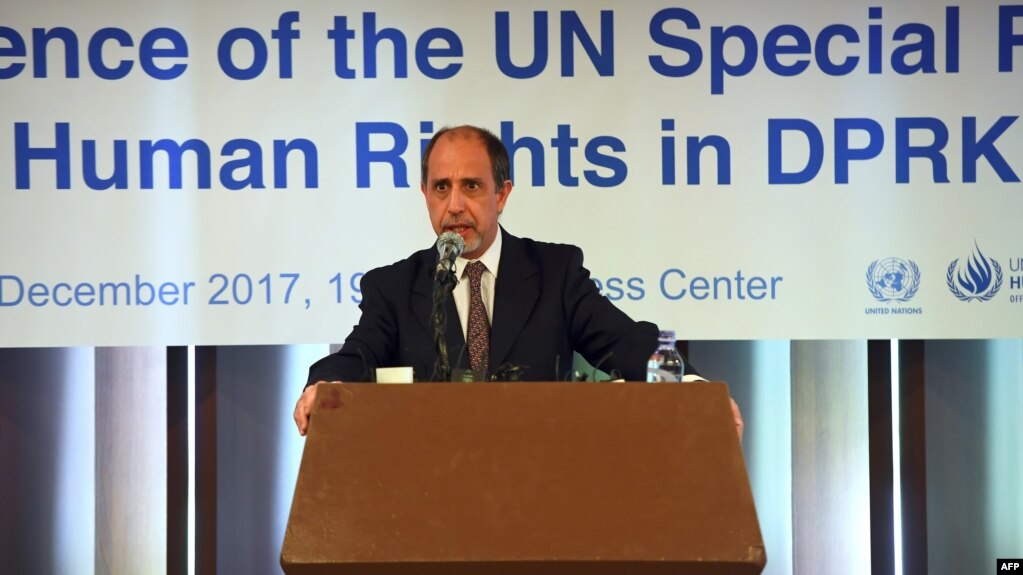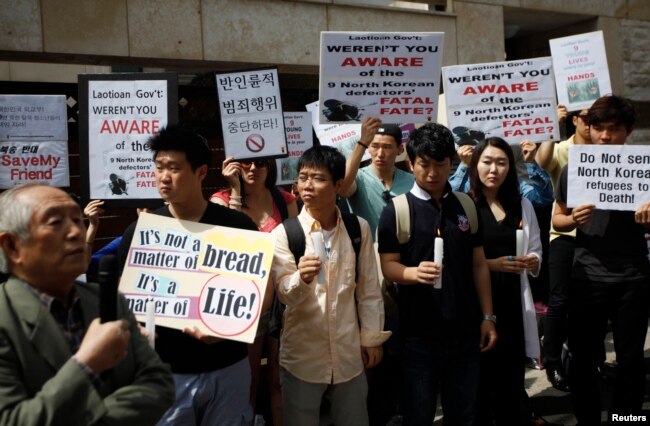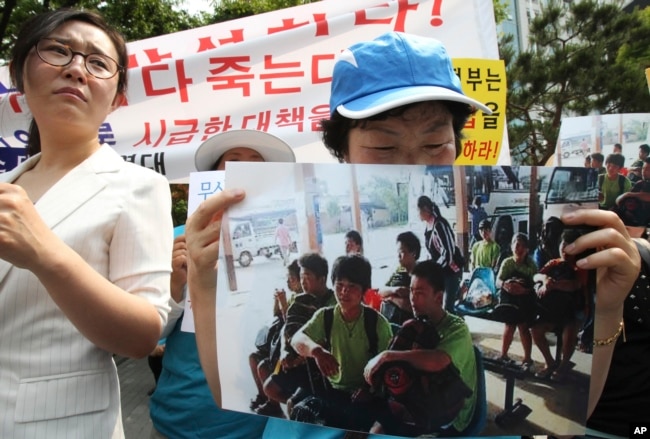By Brian Padden
 North Korean defector Kim Ryon-Hui (C) speaks to reporters during a press conference by Tomas Ojea Quintana, the UN's Special Rapporteur on human rights in North Korea, in Seoul on Dec. 14, 2017.
North Korean defector Kim Ryon-Hui (C) speaks to reporters during a press conference by Tomas Ojea Quintana, the UN's Special Rapporteur on human rights in North Korea, in Seoul on Dec. 14, 2017.SEOUL — North Korean defector Lee Tae-won is still plagued with guilt over his failed efforts to bring his wife and child to South Korea, which resulted in their forced repatriation and the likely prospect of execution in North Korea.
“There's nothing I can say to them except I am sorry. I am really sorry for my son and wife. I am really sorry because there's nothing I can do. There's nothing I can say,” said Lee.
Caught in China
After arriving in South Korea in 2015, the North Korean defector took on the name Lee to try to protect his family from retribution from North Korean security forces.
His wife and four-year-old son were among a group of 10 defectors that where apprehended by China soon after they crossed the North Korean border in late October.
In November he last spoke with his wife by phone while she was in a detention center in China.
“As soon as my wife told me she was being repatriated, the call was cut. I thought the call was cut because the police took the phone. It was devastating,” he said.
This year China has increased the arrests and repatriation of North Koreans attempting to escape the poverty and repression at home.
In November he last spoke with his wife by phone while she was in a detention center in China.
“As soon as my wife told me she was being repatriated, the call was cut. I thought the call was cut because the police took the phone. It was devastating,” he said.
This year China has increased the arrests and repatriation of North Koreans attempting to escape the poverty and repression at home.
According to the advocacy group Human Rights Watch, 41 North Koreans were arrested in July and August alone, compared with 51 arrests documented for the entire year before.
 Ji Seong-ho, center, a North Korean defector living in South Korea and president of Now Action & Unity for Human Rights, attends a rally against Laos' recent repatriation of nine North Korean defectors, in front of the Laotian Embassy in Seoul.
Ji Seong-ho, center, a North Korean defector living in South Korea and president of Now Action & Unity for Human Rights, attends a rally against Laos' recent repatriation of nine North Korean defectors, in front of the Laotian Embassy in Seoul.
Analysts attribute the rise in border arrests to efforts by China to discourage a possible flood of refugees as tougher economic sanctions imposed for Pyongyang’s repeated nuclear and missile tests increases poverty and food scarcity among ordinary North Koreans.
Human rights violations
The total number of defections to South Korea in 2017 was 1,127, which is 20 percent less than the previous year, according to South Korea’s Ministry of Unification.
Phil Robertson, the Deputy Asia Director at Human Rights Watch has criticized China for violating the U.N. Refugee Convention by designating North Korean refugees as illegal “economic migrants,” and forcibly repatriating them despite the likelihood they will be subjected to inhumane treatment.
“This is condemning people to decades of forced labor, possible executions, certainly torture in every case,” said Robertson.
China has also blocked the United Nations Security Council from acting on a General Assembly recommendation to refer North Korea to the International Criminal Court for crimes against humanity, based on a 2014 Commission of Inquiry report documenting a network of political prison camps and systematic human rights abuses, including murder, enslavement, torture, rape, and other sexual violence.
Failed appeal
In November Lee made a public video message appealing to both Xi Jinping and U.S. President Donald Trump to intercede and prevent the repatriation of his family, during the time the U.S. leader was visiting the region.
 An unidentified North Korean defector holds a picture of nine North Korean defectors who were flown home as she cries during a rally protesting against Laos' repatriation of them, in Seoul, South Korea, June 5, 2013.
An unidentified North Korean defector holds a picture of nine North Korean defectors who were flown home as she cries during a rally protesting against Laos' repatriation of them, in Seoul, South Korea, June 5, 2013.
His plea went unanswered.
 Ji Seong-ho, center, a North Korean defector living in South Korea and president of Now Action & Unity for Human Rights, attends a rally against Laos' recent repatriation of nine North Korean defectors, in front of the Laotian Embassy in Seoul.
Ji Seong-ho, center, a North Korean defector living in South Korea and president of Now Action & Unity for Human Rights, attends a rally against Laos' recent repatriation of nine North Korean defectors, in front of the Laotian Embassy in Seoul.Analysts attribute the rise in border arrests to efforts by China to discourage a possible flood of refugees as tougher economic sanctions imposed for Pyongyang’s repeated nuclear and missile tests increases poverty and food scarcity among ordinary North Koreans.
Human rights violations
The total number of defections to South Korea in 2017 was 1,127, which is 20 percent less than the previous year, according to South Korea’s Ministry of Unification.
Phil Robertson, the Deputy Asia Director at Human Rights Watch has criticized China for violating the U.N. Refugee Convention by designating North Korean refugees as illegal “economic migrants,” and forcibly repatriating them despite the likelihood they will be subjected to inhumane treatment.
“This is condemning people to decades of forced labor, possible executions, certainly torture in every case,” said Robertson.
China has also blocked the United Nations Security Council from acting on a General Assembly recommendation to refer North Korea to the International Criminal Court for crimes against humanity, based on a 2014 Commission of Inquiry report documenting a network of political prison camps and systematic human rights abuses, including murder, enslavement, torture, rape, and other sexual violence.
Failed appeal
In November Lee made a public video message appealing to both Xi Jinping and U.S. President Donald Trump to intercede and prevent the repatriation of his family, during the time the U.S. leader was visiting the region.
 An unidentified North Korean defector holds a picture of nine North Korean defectors who were flown home as she cries during a rally protesting against Laos' repatriation of them, in Seoul, South Korea, June 5, 2013.
An unidentified North Korean defector holds a picture of nine North Korean defectors who were flown home as she cries during a rally protesting against Laos' repatriation of them, in Seoul, South Korea, June 5, 2013.His plea went unanswered.
Lee was later told by a friend in North Korea that his wife and child were turned over to a North Korean state security department in late November.
But he continues to speak out to focus world attention on the dangers and atrocities faced by North Korean seeking to flee the authoritarian state.
“It is my goal to inform the international community of the pain defectors in South Korea are experiencing, and the pain North Koreans face,” said Lee.
There is also concern that North Korean human rights violations and China’s complicity are being downplayed by both the U.S. pressure strategy and South Korea’s engagement approach to curb Pyongyang’s nuclear development program.
“It is my goal to inform the international community of the pain defectors in South Korea are experiencing, and the pain North Koreans face,” said Lee.
There is also concern that North Korean human rights violations and China’s complicity are being downplayed by both the U.S. pressure strategy and South Korea’s engagement approach to curb Pyongyang’s nuclear development program.
Focusing on human rights issues could complicate Washington’s efforts to persuade Beijing to enforce tough economic sanctions, and could also undermine Seoul’s efforts to increase cooperation and dialogue with Pyongyang.
On Tuesday, senior officials from 20 nations are meeting in Vancouver for a U.S. and Canada-led summit to discuss increasing diplomatic and financial pressure on Pyongyang to end its missile and nuclear programs.
On Tuesday, senior officials from 20 nations are meeting in Vancouver for a U.S. and Canada-led summit to discuss increasing diplomatic and financial pressure on Pyongyang to end its missile and nuclear programs.
China will not attend the summit and has instead called for continuing the temporary reduction in regional tensions, due to North Korea’s participation in the upcoming Olympics and the U.S. postponement of joint military drills in South Korea.
Aucun commentaire:
Enregistrer un commentaire